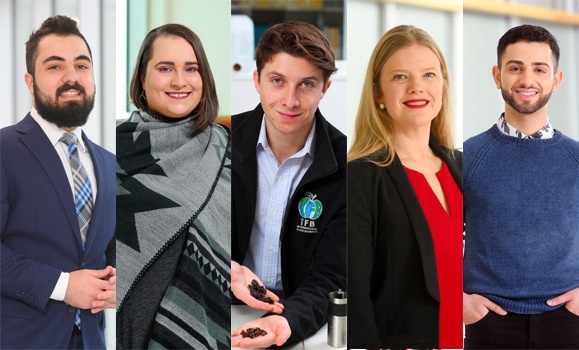There are nearly 19,000 students at Dalhousie. And for many of them, student life is about so much more than just classes and filling the time in between.
For them, student life is a platform for pushing for change. It's a way to connect local concerns with global perspectives. It's a tool for shaping more inclusive communities. And it's a way to inspire others to build a better world.
Dalhousie's Board of Governors' Awards celebrate the most exceptional of these students. It's the university's top award for student life, presented annually to recognize exceptional contributions or leadership in the extracurricular realm — building community on campus, service in the broader community, improving diversity and inclusion and so much more.
The recipients — nominated by their peers in the Dal community, and chosen by a committee consisting of the president, three Board members and the vice-provost student affairs — were honoured at Thursday night's Student Impact Awards.
Learn more about this year's Governors' Award winners:
Yaser Alkayale, Computer Science
Driven to make things better, one idea at a time
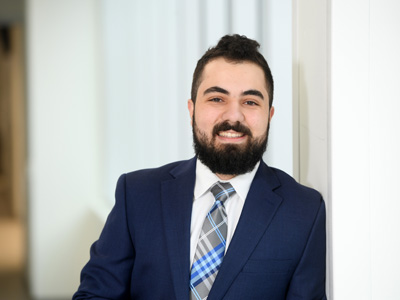 When Yaser Alkayale launched the Syrian Student Society in 2015, he hoped to showcase Syrian culture and heritage within Nova Scotia. But the country’s emerging refugee crisis demanded more.
When Yaser Alkayale launched the Syrian Student Society in 2015, he hoped to showcase Syrian culture and heritage within Nova Scotia. But the country’s emerging refugee crisis demanded more.
“I’m from Syria: I was born and raised there,” says Yaser, a Computer Science undergrad. “And I realized the Canadian community is doing so much in trying to help, and it wouldn’t be right for me to be here in Canada and not provide as much help as I can.”
Wanting to use the society as a platform for Syrian newcomers to have a positive impact at Dalhousie, Yaser worked with colleagues in Computer Science and the College of Continuing Education to lead a free coding camp for Syrian refugees, giving them both computer skills and a window into the possibilities of higher education. It graduated 30 participants in its first year, and soon evolved into an organization called Maritime Labs that hosts camps annually.
It’s just one example of Yaser’s drive and determination to make a difference in people’s lives. He led a team of students to fill a 20-foot container with clothes to be sent to Jordan as part of the Clothes for Refugees program. He worked with the Somali Relief Network of North America to raise over $100,000 for drought victims. And with Shokran Canada, the Syrian Student Society’s marquee event, he helped generate extensive local media coverage and welcome hundreds of guests to explore what he calls “the real Syrian culture,” beyond the headlines.
“Whatever cause I’m passionate about, I’ll put as much time into it as I can,” says Yaser, who received the Faculty of Computer Science Leadership Award last year. “I try to work on things where I can have the greatest impact… I like to see what’s been done, learn from it and then do something better.”
That spirit is inspired by his family’s example. His parents immigrated to Canada in 2006, seeking a better education for Yaser and his four siblings. And it was his father, who ran a mail delivery and shipping company in Syria, who sparked Yaser’s fascination in entrepreneurship when he was just six years old.
That interest led Yaser to become a University Innovation Fellow, attending and leading workshops at Stanford University and helping improve innovation and entrepreneurship offerings at Dalhousie. And while his immediate plans after graduation will take him to Washington State to work for Microsoft, his eventual goal is to use his Computer Science foundation to launch his own startup — though he hasn’t settled on what, exactly, it will be.
“I’m still looking for that idea that is going to have the big impact that I can work on for the long term.” (Ryan McNutt)
Leah Carrier, Nursing
Pushing for change where advocacy meets academics
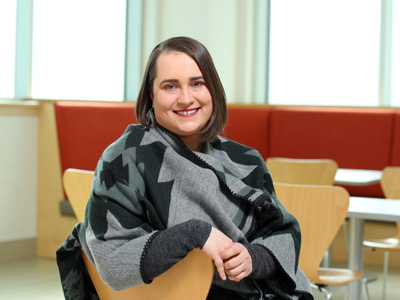 As an Indigenous person and member of the LGBTQ+ community, fourth-year Nursing student Leah Carrier strongly advocates for diversity and inclusion on campus and within the health-care system.
As an Indigenous person and member of the LGBTQ+ community, fourth-year Nursing student Leah Carrier strongly advocates for diversity and inclusion on campus and within the health-care system.
“My education gives me a voice and I want to use my voice to speak against inequities in our society,” she says, “especially in terms of health-care access and the social conditions that influence health.”
As vice-president of student support for the Dalhousie Nursing Society during her second year, Leah noticed gaps that needed to be addressed — in particular, someone who could represent marginalized communities, act on their needs and engage in political advocacy. After helping to create the role’s terms and conditions, Leah was elected the society’s first VP of inclusion and equity this past summer, helping the school and its students make events and activities more inclusive.
Leah has also drawn upon her own personal experiences to tackle mental health initiatives for Nursing students. She co-founded “Secure Your Own Life Mask” with Jaimie Carrier, which focuses on self-care and targeting the unrealistic expectations a lot of students face.
“I have been managing an anxiety disorder for a really long time,” says Leah. “The stress of nursing school caused me to completely re-evaluate how I was dealing with it and create new strategies. After discovering my classmates are also struggling to maintain good mental health, Jamie and I decided it was important to facilitate discussions around self-care skills and securing your own life mask, so you can better help others.”
The initiative uses a nursing lens to assess one’s own health and encourages students to reflect on root causes and triggers to identify ways they can best address them. The initiative also breaks down the idea that health-care professionals have to be perfect in order to take care of their patients, which can often act as a barrier for students seeking help for mental and physical health concerns.
“There’s a myth among health professionals that we have to be invincible because we’re the ones taking care of patients,” says Leah. “We need to create a system where there’s a way to seek help that’s supportive and doesn’t attach stigma or interfere with our confidence in the ability to do our jobs.”
As for her future, Leah hopes to maintain an active clinical practice while working in research and policy. Her placement this year working with a community health nurse in Sipekne’katik First Nation solidified her ambitions.
“Being able to work in an Indigenous community and have an Indigenous mentor was phenomenal for my personal growth, but it also blended all my clinical and academic interests as well,” she says. “It was kind of like the perfect storm that confirmed I was on the right path.” (Delainey Wescott)
Jeremy Stroud, International Food Business
Sparking new ideas on the global stage
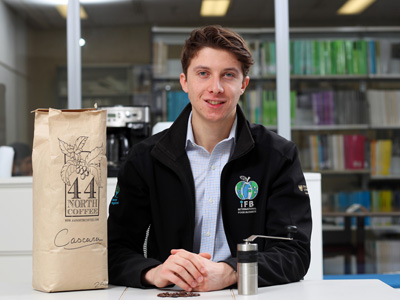 It is the women in Jeremy Stroud’s life that have had the most profound influence on who he has become — his grandmothers, in particular.
It is the women in Jeremy Stroud’s life that have had the most profound influence on who he has become — his grandmothers, in particular.
“One survived a Siberian labour camp during World War II to travel the world and eventually land in Canada to start a family,” says Jeremy. “The other narrowly evaded a Japanese detention camp where her parents were later killed. Each were strong voices while I was growing up… Their stories have led me to better appreciate my life and be thoughtful of what others might be going through.”
They’ve also given him an international perspective. Born and raised in Toronto, he came to Dalhousie’s Agricultural Campus to complete a dual degree in International Food Business (a partnership with Aeres University of Applied Sciences in the Netherlands). He’s travelled to 39 countries and spent time volunteering in agriculture and various charities on four continents.
This spring Jeremy is set to volunteer for a month in Uganda on a World Bank agricultural innovation initiative for college students. This will include stakeholder consultations with industry and faculty members as well as the development of an entrepreneurial learning commons in-country that targets the ag sector.
It’s an experience that will build on his involvement in the Agricultural Campus’s entrepreneurship sandbox, Cultiv8. Jeremy has been participating in Cultiv8 programming since its inception during his first year, and was a semi-finalist at Canada’s Business Model Competition.
“I’m motivated by the notion that I could always be better than I am right now,” says Jeremy. “I’ve found that working on diversified projects, meeting new people and experiencing different situations is the best way for me to accomplish this.”
It’s an attitude he’s brought to improving student life in Truro. He’s held multiple positions in student government, including VP finance and currently president of the Dalhousie Agricultural Students’ Association. He was a student chair of the Farm Credit Canada annual food drive, helping to facilitate the largest donation in the Faculty of Agriculture’s history. A Dalhousie Spirit Award recipient, a Dean’s List student and Orientation leader, Jeremy has left his mark on campus.
“The amount of freedom I encountered on this campus taught me about prioritization and allowed me to grasp the fact that life is too short to worry about things that cannot be changed,” he says. “The many late night basketball sessions, group projects and Sunday coffee chats helped me learn that friendship is a collaboration not a transaction. In Toronto I was too distracted by other parts of my life to truly understand that.”
After graduation this spring, Jeremy will be working for an agricultural investment management firm in Toronto and hopes to one day support agricultural investment initiatives in developing countries. (Stephanie Rogers)
Martha Paynter, Nursing (PhD)
Taking a hands-on approach to leadership in health care
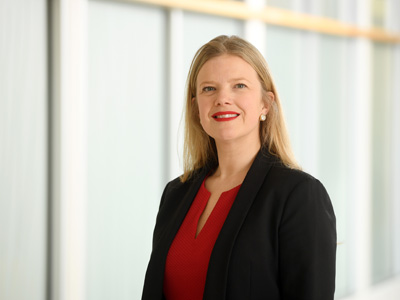 Martha Paynter had spent nearly a decade working for the Department of Health in Nova Scotia and New Brunswick when two events set her life on a new path.
Martha Paynter had spent nearly a decade working for the Department of Health in Nova Scotia and New Brunswick when two events set her life on a new path.
The first was the birth of her two children, and witnessing first-hand the health care provided to them by various nurses. The second was learning about the experiences of Julie Billotta, who was forced to give birth in a jail cell at the Ottawa Carleton Detention Centre in 2012.
“I felt after hearing that [Julia Bilotta story] — I couldn’t live my life the same way anymore,” says Martha. “I felt driven to devote myself professionally and through my volunteer work to support criminalized women.”
She felt driven towards taking a more active, hands-on role in health care. She started a collaboration with Public Health Nurses’ in North End Halifax, offering peer breastfeeding and postpartum support. In 2017, she completed her fast-tracked Bachelor’s of Science in Nursing and, that same year, began the PhD program, with an eye towards bridging the gap between academia and clinical practice.
“Doctoral work is a way to be able to do many things — it’s a way to teach, to learn, to speak, to research, to practice, to volunteer and to advocate,” says Martha.
And that’s exactly what she’s done. Martha currently works as a Family and Newborn Unit nurse at the IWK Health Centre. In 2012, she founded Women’s Wellness Within (WWW), a registered non-profit organization that supports criminalized women during their perinatal period through educational workshops, doula services and providing imprisoned women a voice from within.
She also volunteers regularly with the Chebucto Family Centre Doula Program, providing one-on-one support for newcomers to Canada, and is a director on the Board of the Atlantic Milk Banking Coalition, working to advance the donation and use of human donor milk in Nova Scotia. She’s also a member and former chair of the Women’s Legal Education and Action Fund Halifax Branch (LEAF), advocating for greater access to medical abortions in Nova Scotia and assisting on the LEAF-supported case that pushed for abortion access in PEI in 2016.
“My approach to work is very political,” she says. “I have a very human-rights-based approach to nursing; I think the foundation of nursing is advocacy. My parents always demonstrated [growing up] a commitment to social justice work and true productivity and industriousness.”
Martha pays homage to her many feminist, academic and clinical mentors and offers young activists the same encouragement.
“When I mentor people, I encourage them the same way I’ve been: to just try. You have value in your voice and we always hear the same people. We need more diversity — we need it because it’s rich and imperative for change.” (Emily Borgal)
Jad Sinno, Psychiatry Research (Master’s)
Bridging the personal and political
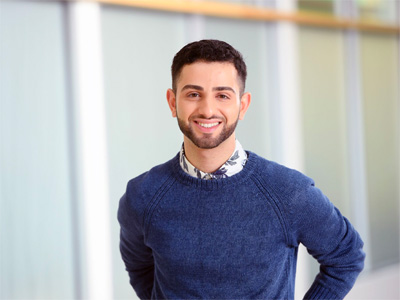 Studying neuroscience as an undergraduate fed Jad Sinno’s curiosity about the brain. But it was the social disparities he encountered along the way that really deepened his fascination with how the mind works.
Studying neuroscience as an undergraduate fed Jad Sinno’s curiosity about the brain. But it was the social disparities he encountered along the way that really deepened his fascination with how the mind works.
“You hear a lot about individuals who have struggled or who have faced certain experiences, and a lot of those stories resonated with me,” says Jad, now a student in Dal’s master’s program in Psychiatry Research.
Inspired by fellow students and keen to make a difference, Jad dove headlong into extracurricular activities during his Dal undergrad, despite having added a second major (Statistics) and minor (Philosophy). He served as an executive with the Dalhousie Arts and Social Sciences Society, a member at large for the Dalhousie Student Union council, and as treasurer, vice-president and president with the Rotaract Club of Halifax, a non-profit community service group for youth.
It was only after a fellow student broke down in tears at a Rotaract meeting in early 2016 that Jad felt compelled to share his own family’s struggle. The woman was upset that her father had been deported, something that had happened to Jad’s father the previous year. Jad organized and moderated a panel on immigration, bringing together experts, students and the deported man’s wife.
“I felt empowered to really help [the student] achieve what she wanted, which was to let people know about the struggle that it is to be an immigrant,” says Jad, whose family first arrived in Halifax from Kuwait in 2004.
Jad’s own father’s deportation after years in legal limbo added an extra layer of difficulty to his own already busy life. While Jad attained nearly $60,000 in scholarships and funding as an undergrad, he had to spend the final year of his bachelor’s degree working nearly 40 hours a week (as a researcher, lab instructor and in the service industry) to assist his family financially.
Around this time, he took on a research assistant role in Amy Bombay’s Indigenous Mental Health and Social Awareness Lab at Dal, subsequently signing on to do his master’s with Dr. Bombay as supervisor. His current thesis research focuses on transcultural psychiatry, specifically the treatment preferences and experiences of various enthno-racial groups in Halifax.
“One of my biggest passions is having a chance to understand an issue at the heart of some inequity in society and know that I have the capacity to help someone who doesn’t experience that inequity better understand it,” he says.
And as Jad looks ahead to attending law school at the University of Toronto this fall, he’ll be able to do so with some peace of mind now that his father has finally secured a return to Canada.
“The stars aligned, I guess you could say.” (Matt Reeder)

